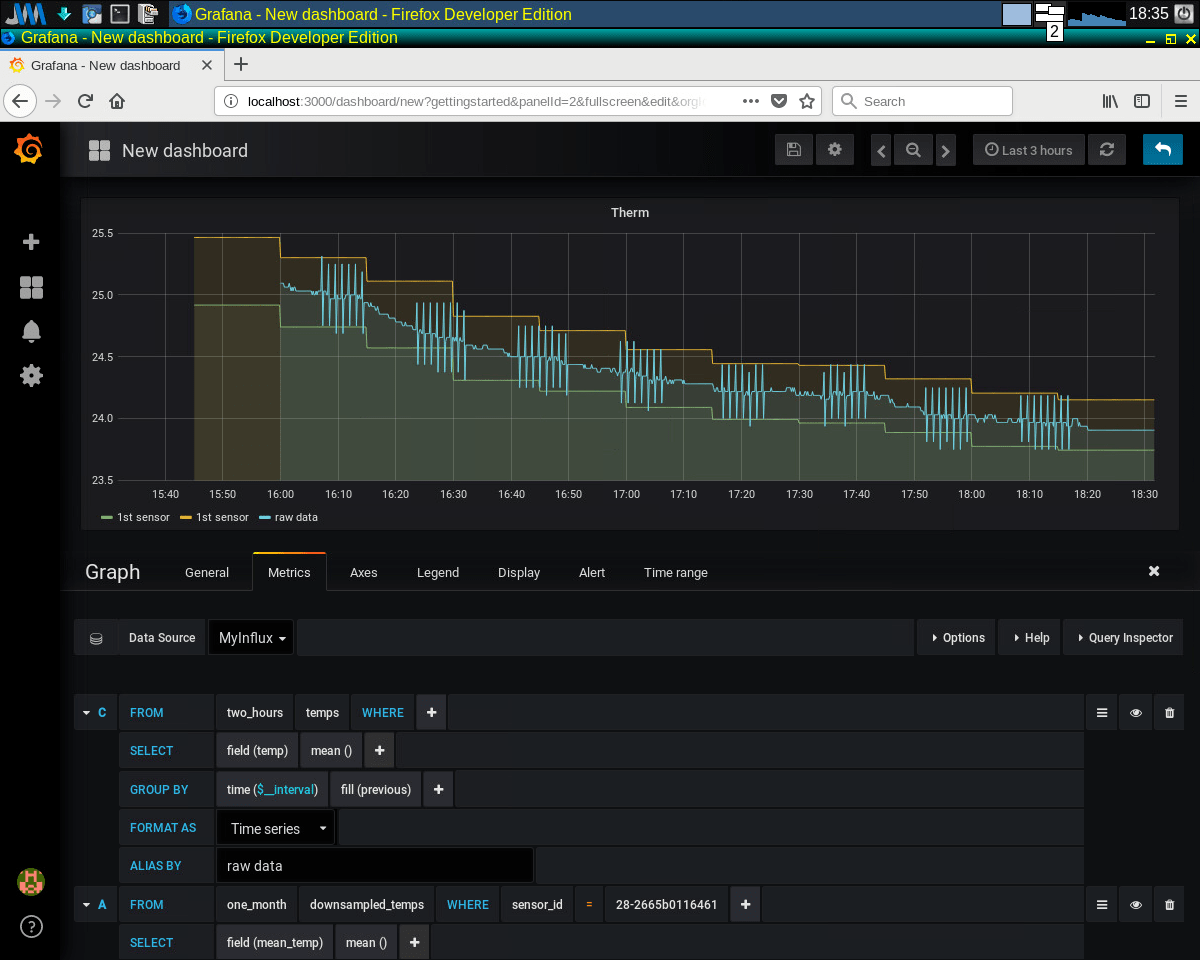Frozen
Here is an active version
Influxdb as a Mechanism for Storing Sensor Readings
Never hurts to have the database, let’s try to store data about temperature measurements. Let’s see if we can use influxdb on Raspberry Pi.
Install
At the time of writing, the dev-lang/go package had version 1.10.1, which did not work on ARM, so I had to make edits to the configuration files1 and install go as:
emerge -1 '=dev-lang/go-9999'
emerge dev-db/influxdb
Let’s check:
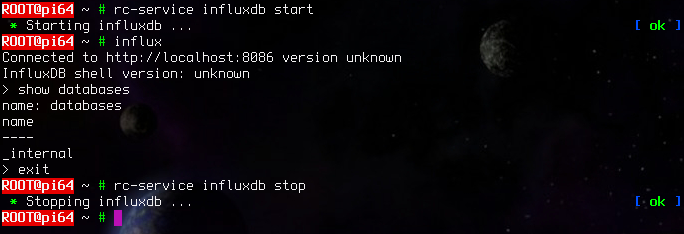
There is a temptation to quickly sketch out the simplest base, to integrate it with Kotlin, and then with some system for building beautiful charts … Stop. We are dealing with a database, even for educational purposes, so let’s train to protect ourselves from unauthorized access.
Create a superuser (username and password changed):
> create user spade with password 'super-password' with all privileges;
In the file /etc/influxdb/influxd.conf we edit the line auth-enabled = true and restart the daemon. After that we check the efficiency of authorization:
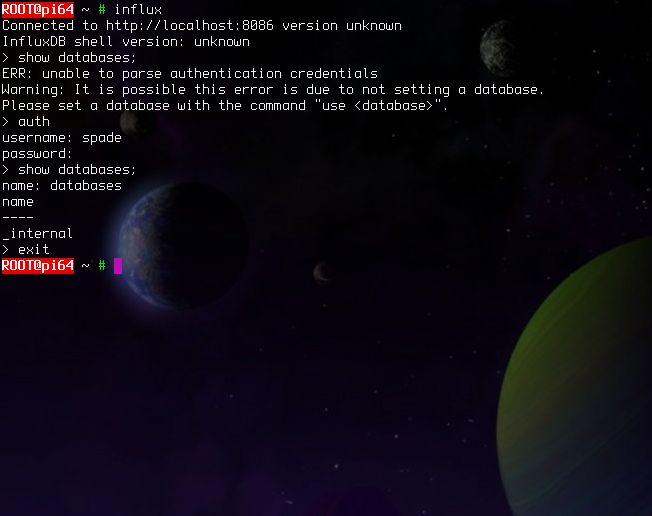
Https
For my purposes, a self-signed certificate is enough (do not forget to specify CN as localhost):
ROOT@pi64 ~# openssl req -x509 -nodes -newkey rsa:2048 \
-keyout /etc/ssl/influxdb-selfsigned.key \
-out /etc/ssl/influxdb-selfsigned.crt -days 360
We add this certificate to the Java repository (password changeit or installed by you):
cd /etc/ssl
openssl x509 -in influxdb-selfsigned.crt -outform der -out influxdb-selfsigned.der
cd /usr/lib64/icedtea8/bin
./keytool -import -alias mykeyroot -keystore /usr/lib64/icedtea8/jre/lib/security/cacerts -file /etc/ssl/influxdb-selfsigned.der
Edit /etc/influxdb/influxdb.conf:
https-enabled = true
https-certificate = "/etc/ssl/influxdb-selfsigned.crt"
https-private-key = "/etc/ssl/influxdb-selfsigned.key"
After restarting the daemon, we check from the normal user:
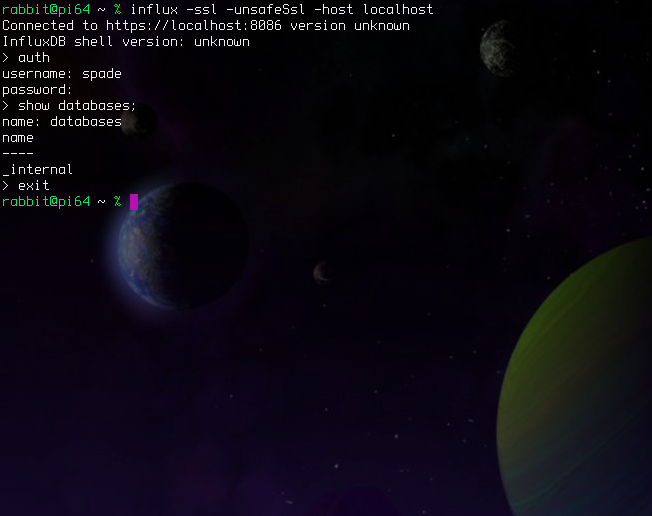
Link with Kotlin
It is necessary to add influx depending on build.gradle:
dependencies {
compile "org.jetbrains.kotlin:kotlin-stdlib-jdk8:$kotlin_version"
compile 'org.jetbrains.kotlinx:kotlinx-coroutines-core:0.22.5'
compile 'org.influxdb:influxdb-java:2.9'
}
To begin with, a tiny program to test the connection to the database:
import org.influxdb.InfluxDBFactory
import kotlin.system.exitProcess
fun main(args: Array<String>) {
println("*** Raspberry Pi Influxdb ***")
val influxDB = InfluxDBFactory.connect(DB_SERVER, DB_USER, DB_PASS)
influxDB.run {
println("Connected to db.")
close()
}
exitProcess(0)
}
const val DB_SERVER = "https://localhost:8086"
const val DB_USER = "spade"
const val DB_PASS = "*******"
Result:
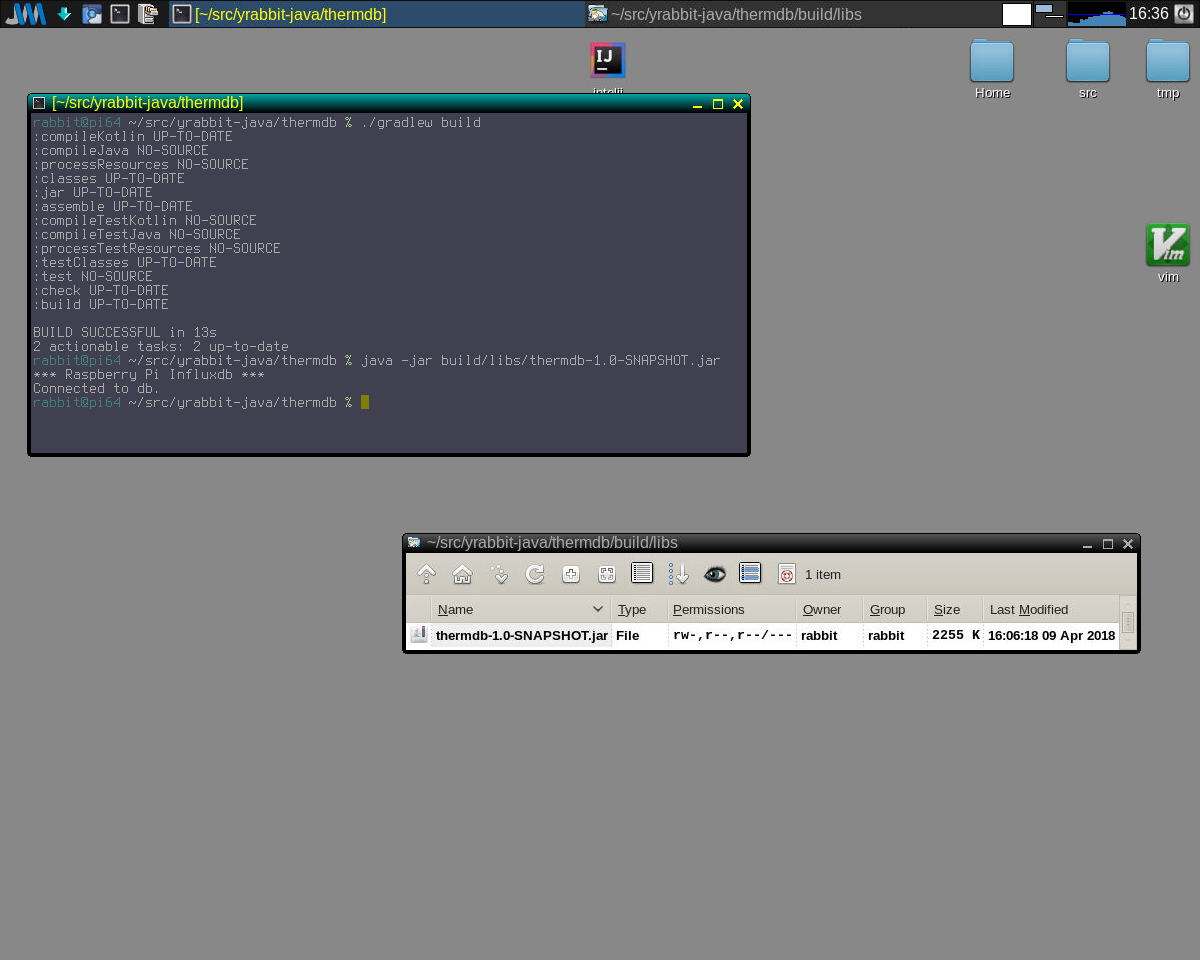
We return to the console and create our database and a special user who can only write data to the database:
rabbit@pi64 ~/src/yrabbit-java/thermdb % influx -ssl -unsafeSsl -host localhost
Connected to https://localhost:8086 version unknown
InfluxDB shell version: unknown
> auth
username: spade
password:
> create database thermdb
> create user sensor with password '********'
> grant write on thermdb to sensor
> create user grafana with password '********'
> grant read on thermdb to grafana
> show users
user admin
---- -----
spade true
sensor false
grafana false
> exit
DB structure
The temps measurement has a very simple structure:
| Field/tag | Type |
|---|---|
| sensor_id | string |
| temp | float |
We set this policy by default, that raw data is stored for 2 hours, packed in 15-minute intervals, stored for month, packed in hourly intervals and after 4 years completely removed:
> create retention policy two_hours on thermdb duration 2h replication 1 default
> create retention policy one_month on thermdb duration 4w replication 1
> create retention policy four_years on thermdb duration 208w replication 1
> create continuous query cq_15m on thermdb begin select mean(temp) as mean_temp into one_month.downsampled_temps from temps group by time(15m),* end
> create continuous query cq_4w on thermdb begin select mean(mean_temp) as mean_temp into four_years.year_temps from one_month.downsampled_temps group by time(1h),* end
as a result we have measurements:
| Measurement | Data Interval | Stored for how long | |
|---|---|---|---|
| temps | raw data | 2 hours | |
| downsampled_temps | 15 minutes | month | |
| year_temps | 1 hour | four years |
Perhaps I will bring requests that pack data in a more readable form:
create continuous query cq_15m on thermdb
begin
select mean(temp) as mean_temp
into one_month.downsampled_temps
from temps
group by time(15m),*
end
create continuous query cq_4w on thermdb
begin
select mean(mean_temp) as mean_temp
into four_years.year_temps
from one-month.downsampled_temps
group by time(1h),*
end
Tst data recording
We return to Kotlin and try to add a couple of records to the database under the new user.
package io.github.yrabbit.kotlin
import kotlinx.coroutines.experimental.delay
import kotlinx.coroutines.experimental.runBlocking
import org.influxdb.BatchOptions
import org.influxdb.InfluxDBFactory
import org.influxdb.dto.Point
import java.util.concurrent.TimeUnit
import kotlin.system.exitProcess
fun main(args: Array<String>) {
println("*** Raspberry Pi Influxdb ***")
val influxDB = InfluxDBFactory.connect(DB_SERVER, DB_USER, DB_PASS)
influxDB.run {
println("Connected to db")
setDatabase(DB_NAME)
setRetentionPolicy(DEFAULT_RETENTION)
enableBatch(BatchOptions.DEFAULTS.flushDuration(FLUSH_INTERVAL))
runBlocking {
influxDB.write(Point.measurement(RAW_TEMP_MEASUREMENT)
.tag("sensor_id", "test sensor")
.time(System.currentTimeMillis(), TimeUnit.MILLISECONDS)
.addField("temp", 0.123)
.build())
delay(1000)
influxDB.write(Point.measurement(RAW_TEMP_MEASUREMENT)
.tag("sensor_id", "test sensor")
.time(System.currentTimeMillis(), TimeUnit.MILLISECONDS)
.addField("temp", 0.723)
.build())
}
close()
}
exitProcess(0)
}
const val DB_SERVER = "https://localhost:8086"
const val DB_USER = "sensor"
const val DB_PASS = "************"
const val DB_NAME = "thermdb"
const val RAW_TEMP_MEASUREMENT = "temps"
const val DEFAULT_RETENTION = "two_hours"
const val FLUSH_INTERVAL = 10 * 60 * 1000 // 10m
After making a few starts and leaving Raspberry Pi to work for a while we get:
rabbit@pi64 ~ % influx -precision rfc3339 -ssl -unsafeSsl -host localhost
Connected to https://localhost:8086 version unknown
InfluxDB shell version: unknown
> auth
username: spade
password:
> use thermdb
Using database thermdb
> select * from temps
name: temps
time sensor_id temp
---- --------- ----
2018-04-10T09:11:19.217Z test sensor 0.123
2018-04-10T09:11:20.265Z test sensor 0.723
2018-04-10T09:11:31.814Z test sensor 0.123
2018-04-10T09:11:32.856Z test sensor 0.723
2018-04-10T09:11:38.395Z test sensor 0.123
2018-04-10T09:11:39.439Z test sensor 0.723
2018-04-10T09:11:54.984Z test sensor 0.123
2018-04-10T09:11:56.026Z test sensor 0.723
...
2018-04-10T10:59:37.558Z test sensor 0.123
2018-04-10T10:59:38.609Z test sensor 0.723
2018-04-10T11:00:14.761Z test sensor 0.123
2018-04-10T11:00:15.804Z test sensor 0.723
> select * from one_month.downsampled_temps
name: downsampled_temps
time mean_temp sensor_id
---- --------- ---------
2018-04-10T09:00:00Z 0.42299999999999993 test sensor
2018-04-10T09:15:00Z 0.42300000000000004 test sensor
2018-04-10T09:30:00Z 0.42300000000000004 test sensor
2018-04-10T09:45:00Z 0.423 test sensor
2018-04-10T10:00:00Z 0.42300000000000004 test sensor
2018-04-10T10:15:00Z 0.42299999999999993 test sensor
2018-04-10T10:30:00Z 0.42300000000000004 test sensor
2018-04-10T10:45:00Z 0.423 test sensor
> select * from four_years.year_temps
name: year_temps
time mean_temp sensor_id
---- --------- ---------
2018-04-10T10:00:00Z 0.42300000000000004 test sensor
>
Excellent! Raw data, first and second ordering are viewed. The following data are given the next morning: raw data has already been destroyed, 15 minutes and hourly readings have been generated.
> select * from temps
> select * from one_month.downsampled_temps
name: downsampled_temps
time mean_temp sensor_id
---- --------- ---------
2018-04-10T09:00:00Z 0.42299999999999993 test sensor
2018-04-10T09:15:00Z 0.42300000000000004 test sensor
2018-04-10T09:30:00Z 0.42300000000000004 test sensor
2018-04-10T09:45:00Z 0.423 test sensor
2018-04-10T10:00:00Z 0.42300000000000004 test sensor
2018-04-10T10:15:00Z 0.42299999999999993 test sensor
2018-04-10T10:30:00Z 0.42300000000000004 test sensor
2018-04-10T10:45:00Z 0.423 test sensor
2018-04-10T11:00:00Z 0.423 test sensor
2018-04-10T11:15:00Z 0.423 test sensor
2018-04-10T12:00:00Z 0.423 test sensor
2018-04-10T12:15:00Z 0.423 test sensor
> select * from four_years.year_temps
name: year_temps
time mean_temp sensor_id
---- --------- ---------
2018-04-10T10:00:00Z 0.42300000000000004 test sensor
2018-04-10T11:00:00Z 0.423 test sensor
2018-04-10T12:00:00Z 0.423 test sensor
>
Add to the program a poll of sensors, the correct completion of work with the database and leave work until tomorrow![]()
package io.github.yrabbit.kotlin
import kotlinx.coroutines.experimental.delay
import kotlinx.coroutines.experimental.runBlocking
import org.influxdb.BatchOptions
import org.influxdb.InfluxDBFactory
import org.influxdb.dto.Point
import java.io.File
import java.nio.file.FileSystems
import java.nio.file.Files
import java.nio.file.Path
import java.nio.file.Paths
import java.util.concurrent.TimeUnit
import java.util.stream.Collectors
import kotlin.system.exitProcess
fun main(args: Array<String>) {
println("*** Raspberry Pi Influxdb ***")
val influxDB = InfluxDBFactory.connect(DB_SERVER, DB_USER, DB_PASS)
influxDB.run {
println("Connected to db")
// exit correctly
Runtime.getRuntime().addShutdownHook(Thread {
run {
println("Finish.")
influxDB.close()
}
})
setDatabase(DB_NAME)
setRetentionPolicy(DEFAULT_RETENTION)
enableBatch(BatchOptions.DEFAULTS.flushDuration(FLUSH_INTERVAL))
runBlocking {
while (true) {
val sensors = findSensors()
sensors.forEach { sensor_id ->
val (therm, status) = readSensor(sensor_id)
if (status) {
influxDB.write(Point.measurement(RAW_TEMP_MEASUREMENT)
.tag("sensor_id", sensor_id)
.time(System.currentTimeMillis(), TimeUnit.MILLISECONDS)
.addField("temp", therm)
.build())
}
}
delay(SENSOR_READ_INTERVAL)
}
}
}
exitProcess(0)
}
/*
* Find all sensors in /sys/bus/w1/devices/
*/
fun findSensors(): List<String> {
val dir = File(SENSORS_PATH)
val fileNames = dir.list().filter { name -> name.startsWith("28-")}
return(fileNames)
}
/*
* Read sensor value
* status = true -> data Ok
* status = false -> error
*/
data class thermResult(val therm: Double, val status: Boolean)
fun readSensor(path: String): thermResult {
var status = false
var therm = 0.0
try {
val sensorData = File("$SENSORS_PATH/$path/w1_slave").readLines()
if (sensorData.size == 2) {
if (sensorData[0].endsWith("YES")) {
therm =sensorData[1].takeLast(5).toDouble() * 0.001
status = true
}
}
} catch(e: Exception) {
}
return(thermResult(therm, status))
}
const val DB_SERVER = "https://localhost.ssl:8086"
const val DB_USER = "sensor"
const val DB_PASS = "look"
const val DB_NAME = "thermdb"
const val RAW_TEMP_MEASUREMENT = "temps"
const val DEFAULT_RETENTION = "two_hours"
const val FLUSH_INTERVAL = 10 * 60 * 1000 // 10m
const val SENSOR_READ_INTERVAL = 10 * 1000 // 10 seconds
const val SENSORS_PATH = "/sys/bus/w1/devices"
Grafana
Let’s do the visualization of the data. The easiest way is to use such a thing as Grafana
~# emerge grafana-bin
And then follows the usual black magic: installing this package, we do not actually use the server from it, because it still does not work and I’m too lazy to understand why. So we will build our server from the sources and replace the executable file. Note that the whole build goes under the normal user:
~% go get github.com/grafana/grafana
~% ~/go/src/github.com/grafana/grafana
~% go run build.go setup
~% go run build.go build
~% cp ~/go/bin/grafana-server /tmp
~% sudo mv /tmp/grafana-server /usr/bin/
~% sudo rc-service grafana start
In the browser, open the pagehttp://localhost:3000. User name admin/admin (or what is stated in /etc/grafana/grafana.ini2).
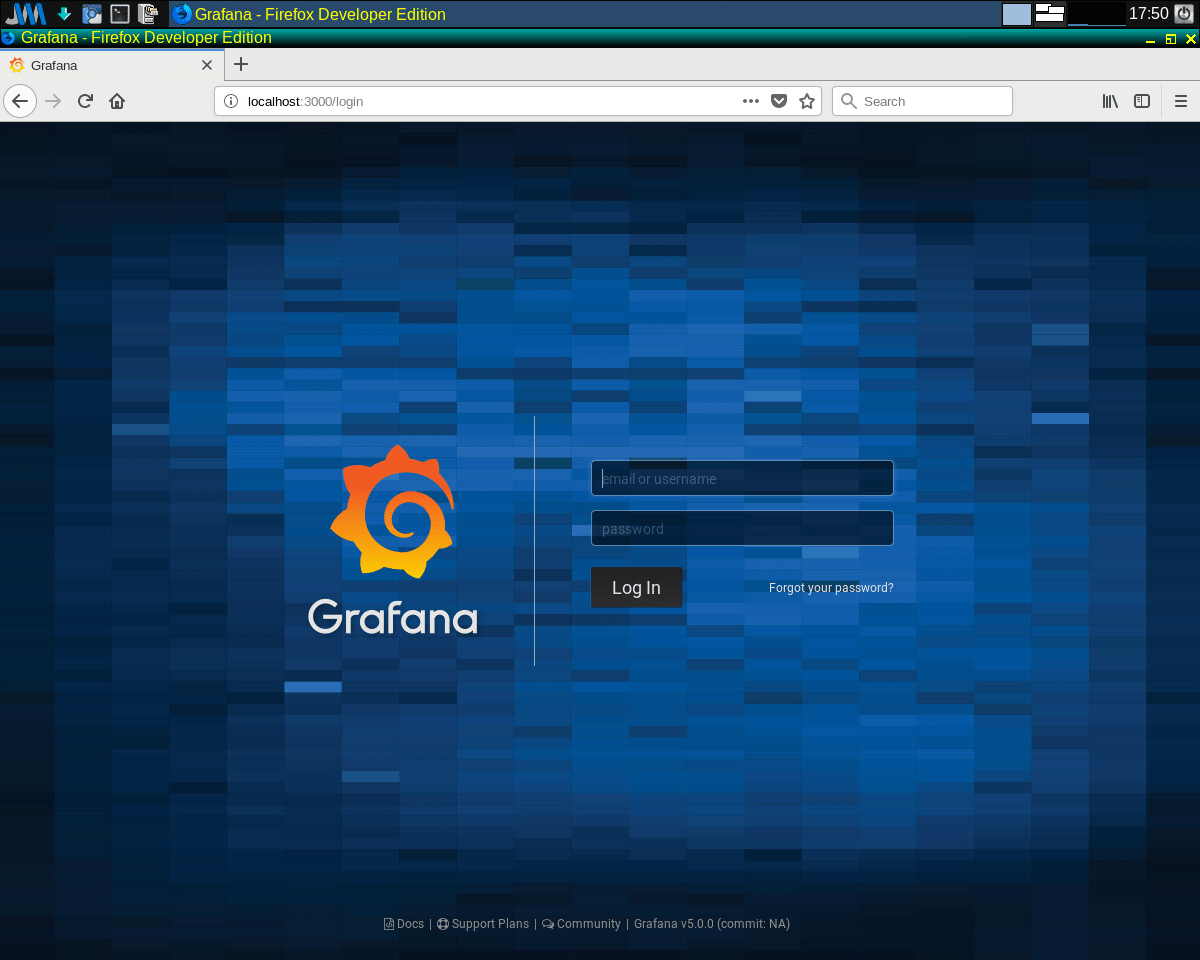
Add the data source:
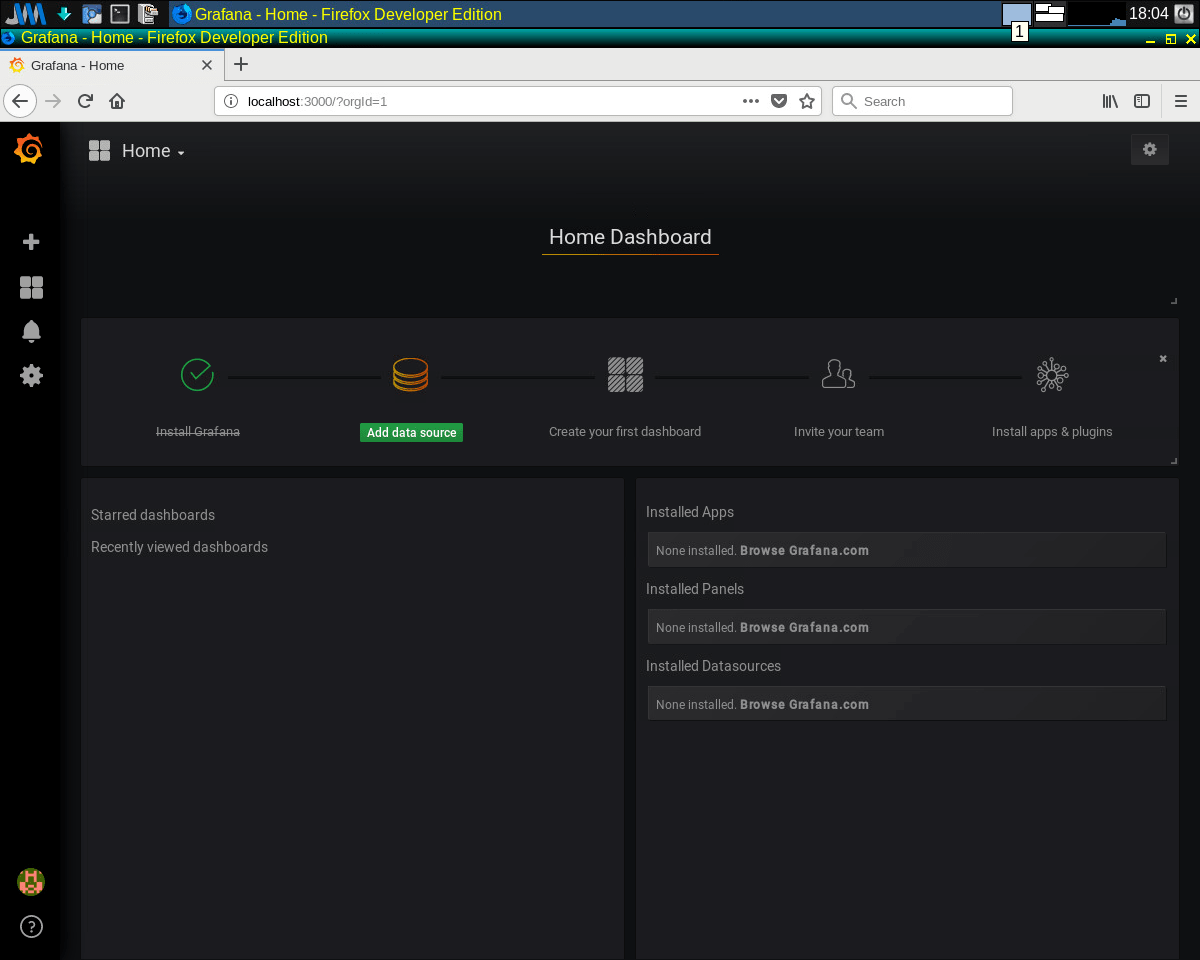
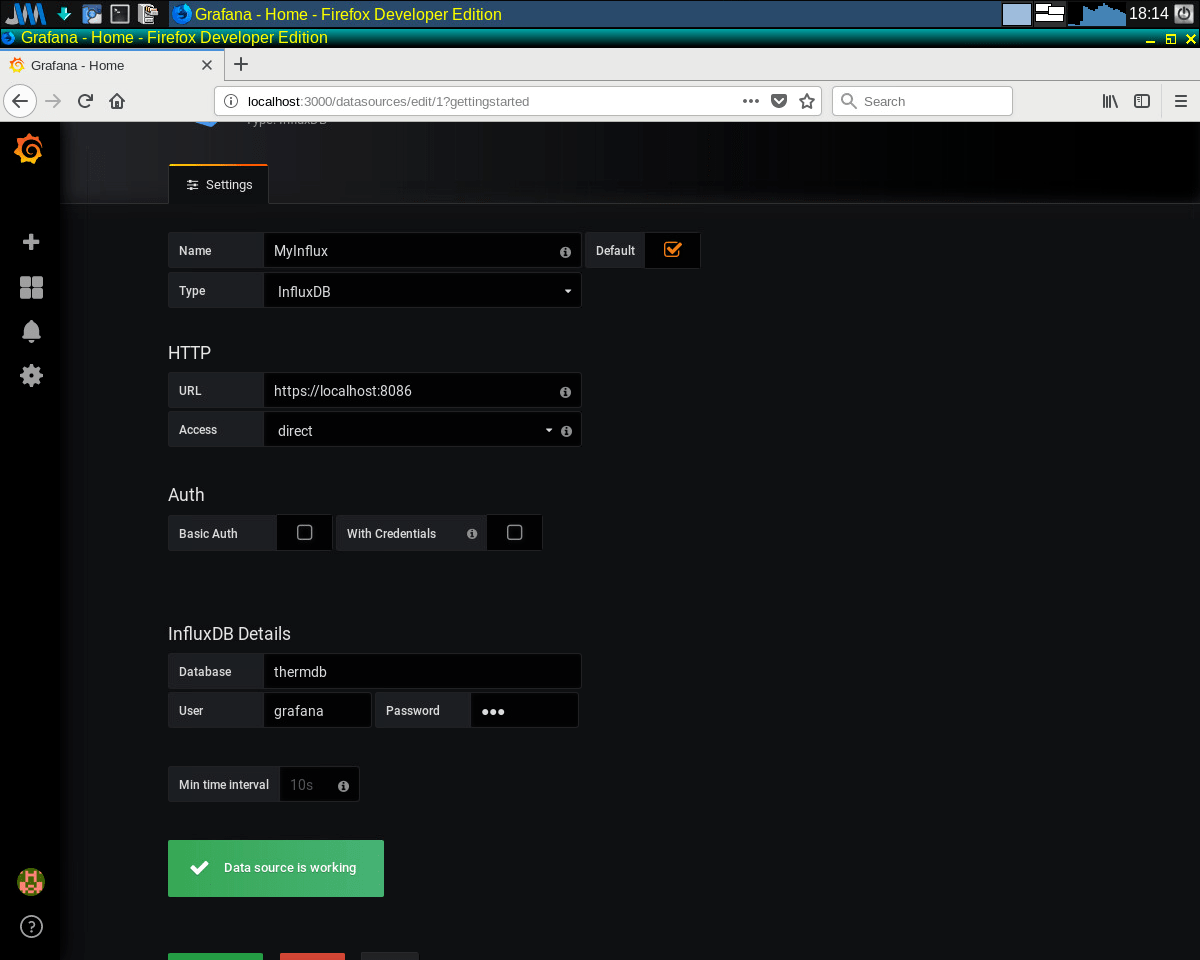
Next, add a panel, the most simple:
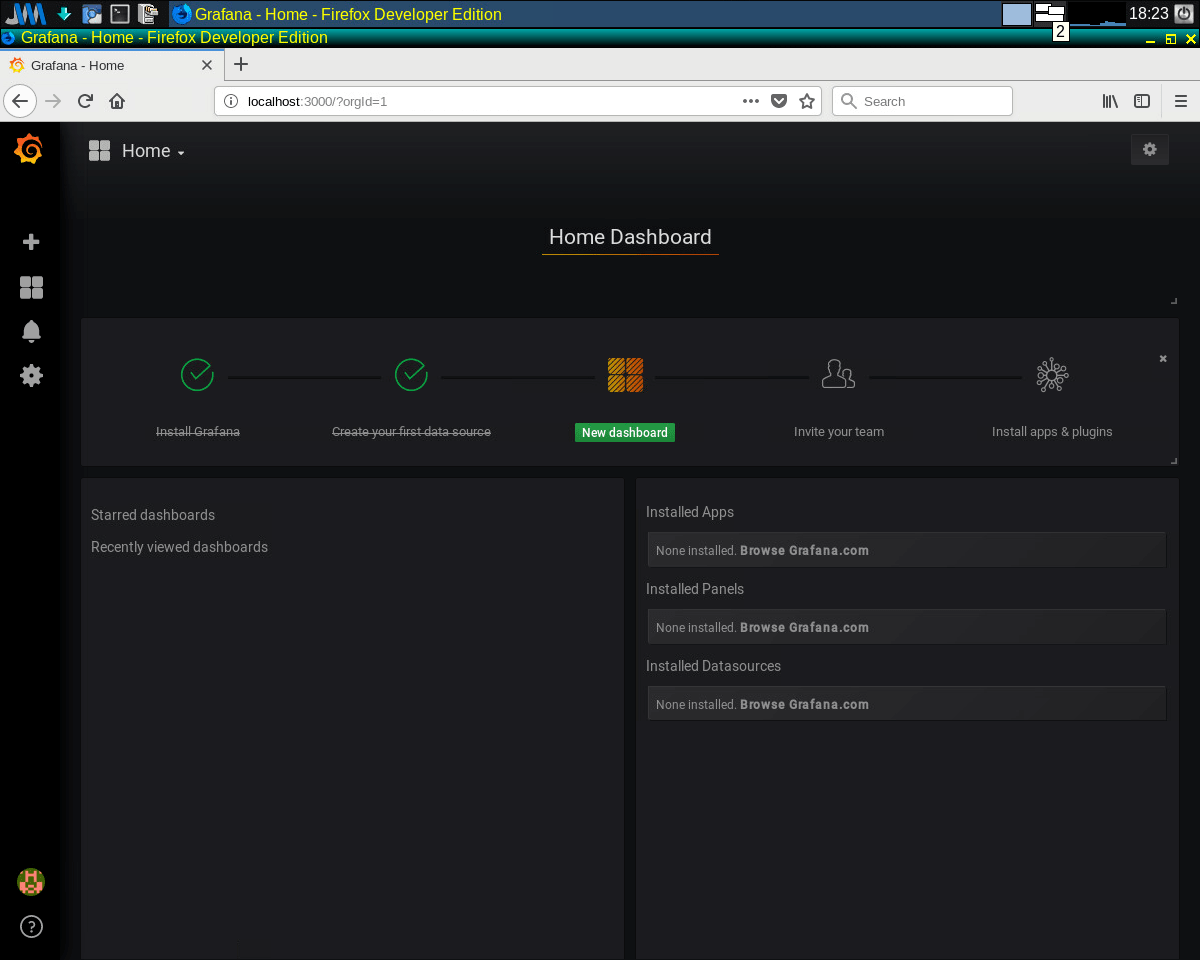
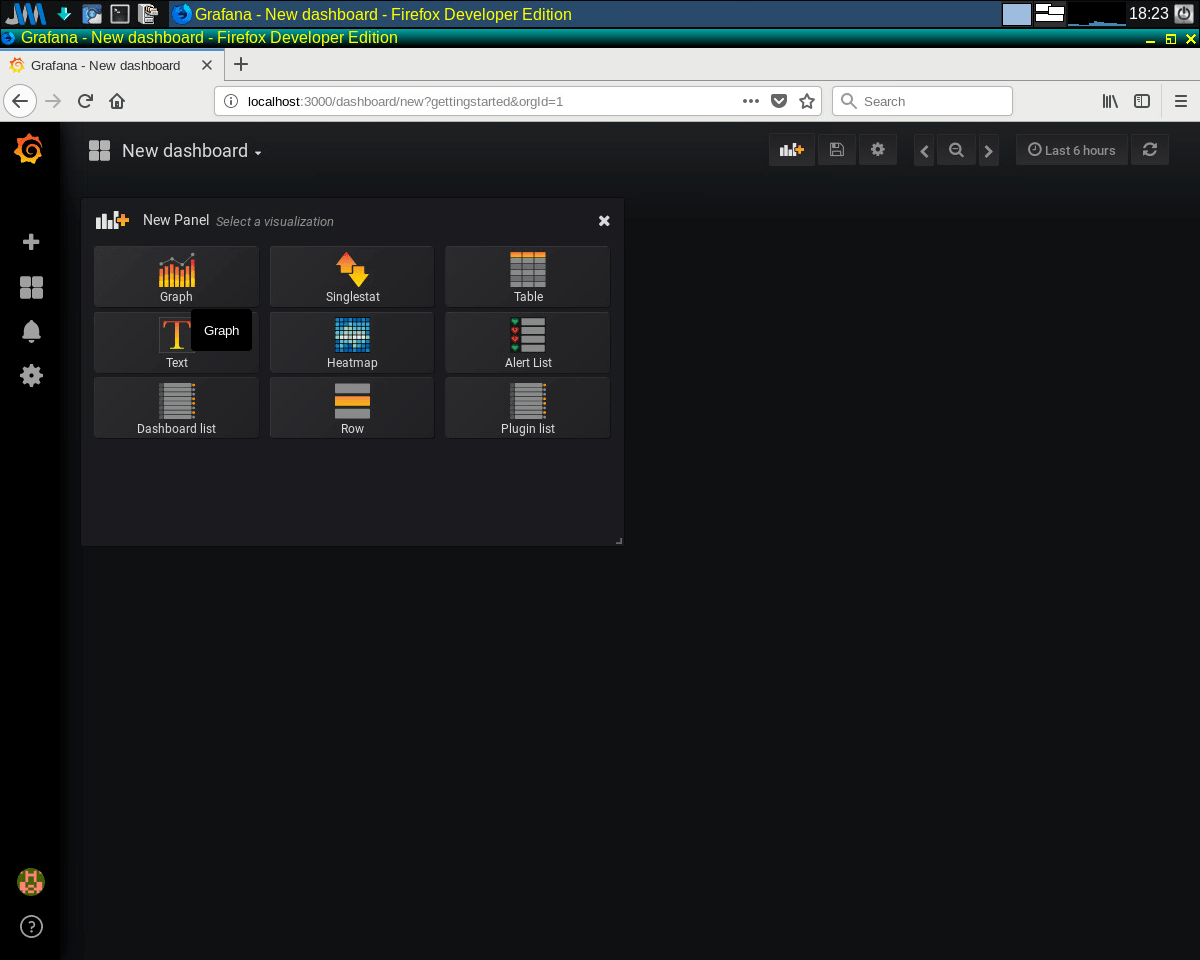
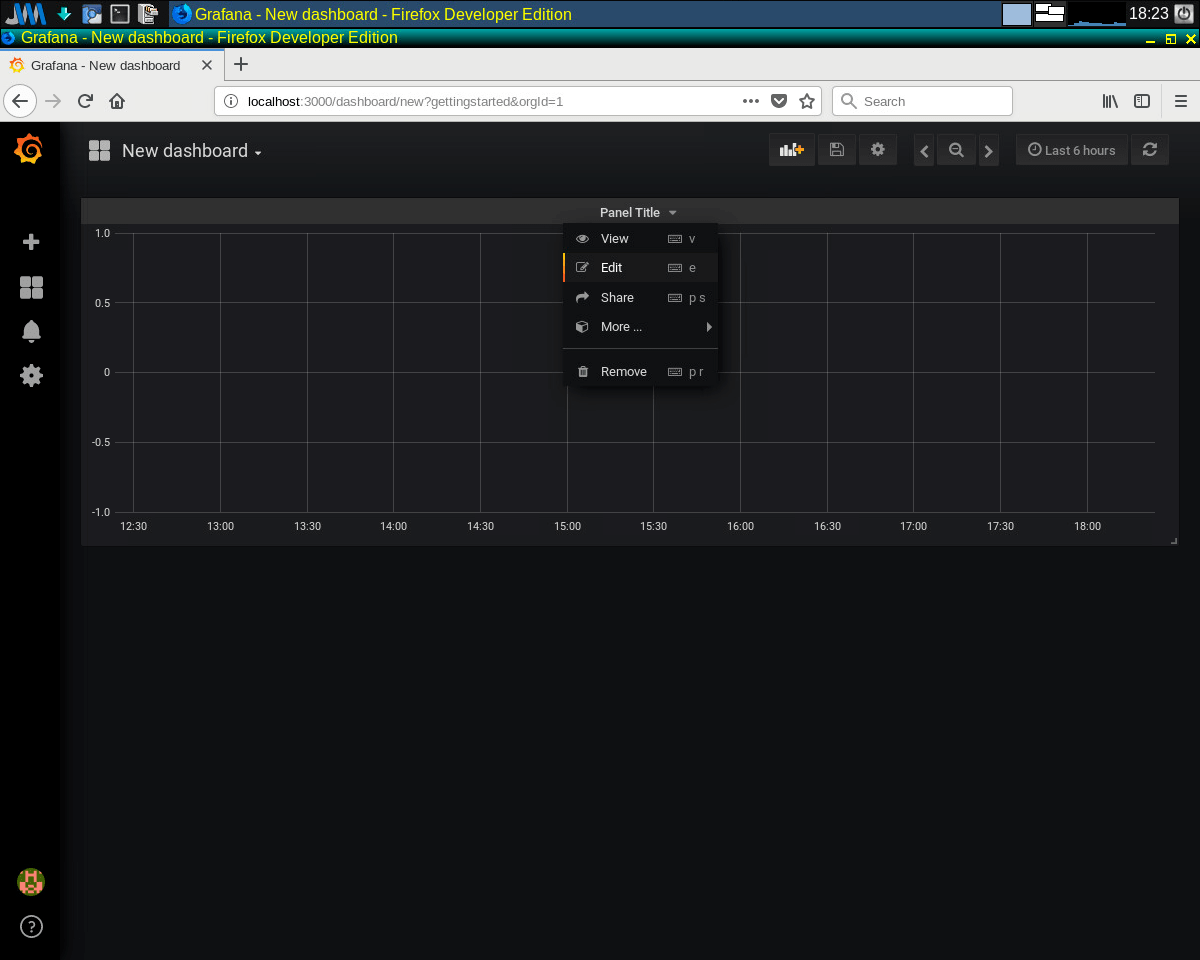
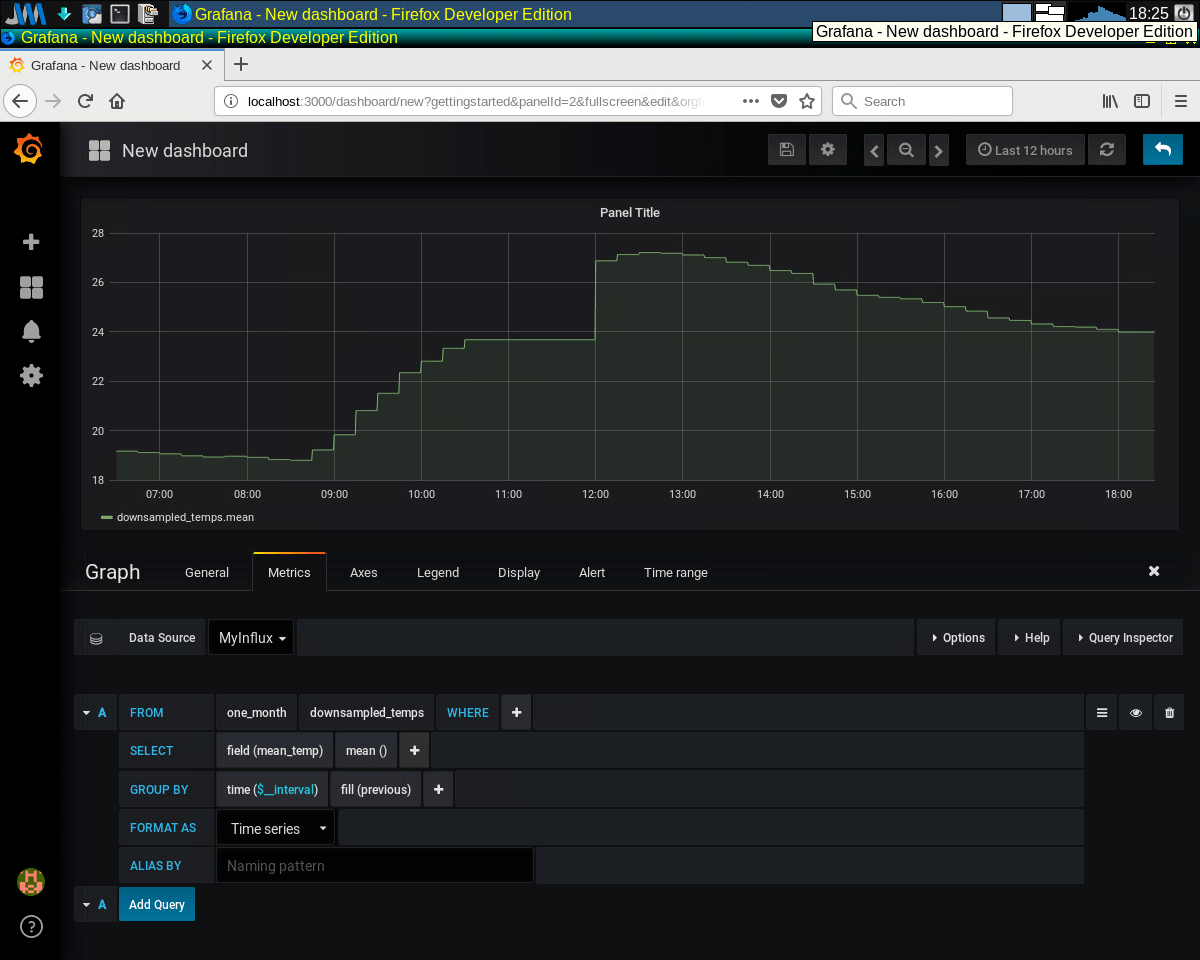
And how do you like this beauty?![]()
